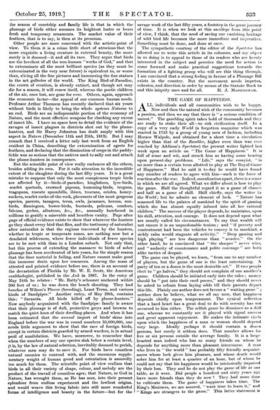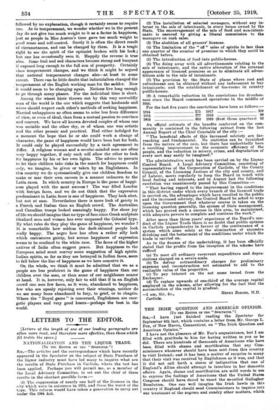THE GAME OF HAPPINESS.
ALL individuals and all communities wish to be happy. Now and then the natural wish of the community becomes a passion, and then we say that there is " a serious condition of unrest." The gambling spirit takes hold of thousands and they are ready to stake their all—to risk civilization itself. In a copy of a very early World (a forgotten magazine which was started in 1753 by a group of young men of fashion, including Horace Walpole, and obtained for a short time a circulation higher than that of the Rambler, higher even than was ever reached by Addison's Spectator) the present writer lighted last
week upon an article on " The Game of Happiness." It is full of sense and wit, and struck him as having some bearing upon present-day problems. " Life," says the essayist, is no more than a certain term allotted to play at The Royal Game of Happiness." Had he said it to-day he would have found any number of readers to agree with him—such is the force of reaction after the war. Indeed, moralization apart, there is a sense in which we are all agreed. What we differ about is how to play the game. Half the thoughtful regard it as a game of chance and half as a. game of skill. Skill chiefly, says the writer in
the World ; but he admits an element of luck. " Nature has
seasoned life to the palates of mankind by the spirit of gaming which she has almost equally infused into all her rational children." The success of the player depends, he maintains, upon his skill, attention, and courage. It does not depend upon what are usually called his circumstances. To say that wealth will not ensure it is an unpardonable truism ; and " if poverty and contentment had been the vehicles to convey it to mankind, a sickly calm would stagnate all activity." " Deep gaming and high playing " are less dangerous than " avarice." On the other hand, he is convinced that " the sharper " never wins, and "audacity of countenance and polite cozenage " are both alike tactics of despair.
The game can be played, we learn, " from one to any number of players, but the game of one is the least entertaining. A party of ten or a dozen is the most desirable set." If two people elect to " go halves," they should not complain of one another's game. Children should be initiated early into the rules ; money should be " put into their card purses," and they should never be asked to refrain from laying odds till their parents depart this life. Plainly our author does not favour a " waiting game " ; neither does he believe, what we all say now, that happiness
depends chiefly upon temperament. The cynical reflection that a hard heart has a great deal to do with serenity has not
occurred to him either. The selfish game he dismisses as a dull one, whereas we constantly see it played with signal success and great apparent enjoyment. He makes the intimate circle upon which the happiness of a man or woman should depend very large. Ideally perhaps it should contain a dozen persons, but surely it seldom does. That number allows foi five or six persons outside the average family. It is a large hearted man indeed who has so many friends on whom he depends for anything more than pleasant intercourse. A man who lives in " the world " has probably fifty friendly acquaint ances whose luck gives him pleasure, and whose death would sober him for at least a quarter of an hour, but of whom he could not say that his happiness would be intrinsically impaired by their loss. They and he do not play the game of life at one table, as it were. Did people a hundred and sixty years age have more friends than they do now ? They had more time to cultivate them. The game of happiness takes time. The King's Ministers, we are assured, " want time to learn it," and " Kings are strangers to the game." This latter statement is followed by no explanation, though it certainly seems to require one. As to temperament, we wonder whether we in the present day do not give too much weight to it as a factor in happiness, just as people in Miss Austen's time gave too much weight to good sense and self-control. Surely it is often the direct result of circumstances, and can be changed by them. It is a tragic
sight to see the spirit of the optimist broken with his luck ; but one has occasionally seen it. Happily the reverse is true
also. Some frail and sad characters become strong and buoyant if exposed long enough to the full sun of prosperity. Certainly class temperament changes, and we think it might be argued that national temperament changes also—at least to some extent. There can be little doubt that industrialism changed the temperament of the English working man for the sadder. Now it would seem to be changing again. Nations live long enough to go through many phases. For the individual time is short.
Among the wisest hints thrown out by this very unworldly man of the world is the one which suggests that husbands and wives should respect each other's methods of seeking happiness. Married unhappiness so often seems to arise less from difference of view, or even of ideal, than from a mutual passion to convince and convert. We have all known devoted couples of whom one was sociable and the other shy, or of whom one was artistic and the other prosaic and practical. Had either indulged for a moment the hope that he or she could work a change of character, the game of happiness would have been lost for both. It could only be played successfully by a tacit agreement to differ. A religious woman and a. secular-minded man are often very happy together, if only each will allow the other to look for happiness by his or her own lights. The advice to parents to let their children take risks in the search for happiness could only, we imagine, be given or taken by an Englishman. In this country we do systematically give our children freedom to make or mar their own careers in a manner unknown to the Latin races. In which country in Europe is the game of happiness played with the most success ? The war filled London with foreign faces, and we do not think that the expression predominant in Latin faces is one of happiness. They look alert, but not at ease. Nevertheless there is more look of gaiety in a French and Italian than an English crowd. The Australian and Canadian troops looked amazingly happy. For sheer joy of life we should imagine that no type of face since Greek sculptors idealized men and women has ever surpassed the colonial type. By what rules do they play the game of happiness, we wonder ? It is remarkable how seldom the dark-skinned people look really happy. The negro face has often a rather silly look which caricatures gaiety, but serene happiness of expression seems to be confined to the white race. The faces of the higher natives of India often suggest peace. But happiness to the European mind must convey some suggestion of high spirits. Indian spirits, so far as they are betrayed in Indian faces, seem to fall below the line of happiness as we here conceive it.
On the whole, we think it must be admitted that we as a people are less proficient in the game of happiness than our children over the seas, or than some of our neighbours nearer at hand. It is, however, only fair to add that if in an English crowd one sees few faces, as it were, abandoned to happiness, few who are openly rejoicing over their winnings, neither do we see many faces abandoned to fury, to grief, or to chagrin. Where the " Royal game " is concerned, Englishmen are energetic players and very good losers—perhaps the best in the world.











































 Previous page
Previous page